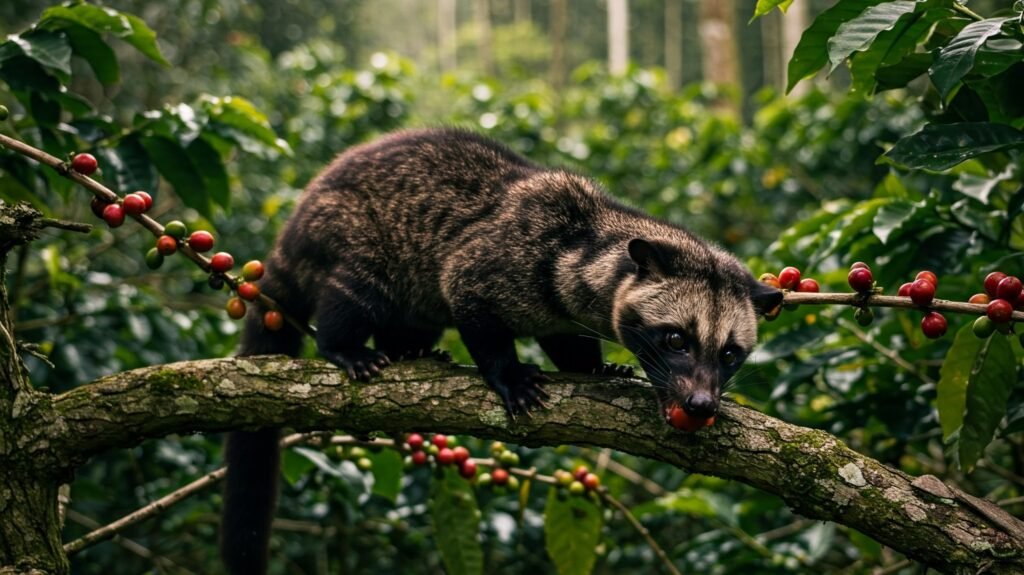Feces coffee (sometimes nicknamed “poop coffee”) refers to specialty brews made from beans that animals have eaten and excreted. For example, Indonesian kopi luwak is made from beans defecated by wild palm civets, and Thailand’s Black Ivory coffee comes from beans passed through elephants. In each case the fruit pulp is fermented in the animal’s gut, and fans claim this imparts a unique smoothness and aroma to the coffee. Other exotic examples include Brazil’s jacu bird coffee and “monkey parchment” coffee (beans chewed by macaques). All of these are rare luxury products prized more for novelty and flavor than volume.
- Historical Background
- Types and Sources
- Production Process
- Taste Profile
- Market Analysis
- Controversies and Ethical Issues
- Health and Safety
- Cultural Impact
- The Civet Coffee Goes Global
- The Elephant Brew: Origins of Black Ivory Coffee
- Brewing Alchemy: Fermentation in the Gut
- The Allure of the Cup: Flavor and Rarity
- Controversy and Ethics
- From Forest to Porcelain: Feces Coffee Today
Historical Background
Kopi Luwak’s story is tied to Dutch colonial coffee plantations in Indonesia. In the 1800s, Javan and Sumatran plantation workers noted that civets (Paradoxurus hermaphroditus) would eat fallen ripe cherries and excrete the undigested beans. They began collecting, cleaning, and brewing these beans, discovering a particularly smooth, low-acidity coffee. (Modern analysis by Dr. Massimo Marcone later confirmed that the civet’s gastric juices do measurably alter the beans’ chemical composition and flavor.)
Black Ivory coffee is far newer. Canadian entrepreneur Blake Dinkin developed it in the 2000s at a Thai elephant refuge (the Golden Triangle Asian Elephant Foundation in Chiang Saen). In this program, rescued Asian elephants were fed select Thai-grown Arabica cherries (often mixed with bananas and rice) and their dung was searched for intact beans. The product was launched commercially in the 2010s.
Types and Sources
| Coffee Type | Animal | Region(s) | Price (approx.) |
|---|---|---|---|
| Kopi Luwak | Asian palm civet | Indonesia, Vietnam, Philippines | $220–$1,300/kg |
| Black Ivory | Asian elephant | Thailand (Chiang Saen, Surin) | ≈$3,300/kg |
| Jacu Bird Coffee | Jacu bird | Brazil (Espírito Santo) | ≈$660–$1,100/kg |
Production Process
The process begins with feeding ripe coffee cherries to animals (elephants, civets, or birds). After digestion (15–70 hours depending on the animal), beans are collected from feces, washed, dried, and roasted. The fermentation and enzymatic breakdown during digestion reportedly smooth out bitterness and enhance flavor.
Taste Profile
These coffees are known for a smooth, sweet taste:
- Kopi Luwak: Full body, low acidity, chocolate, caramel, and honey notes.
- Black Ivory: Smooth, mild, clean finish; hints of chocolate, citrus, tamarind, black tea.
- Jacu Bird Coffee: Lighter, fruitier, nutty or berry-like notes.
Market Analysis
Feces coffees are high-end luxury products:
- Kopi Luwak: $100–$600/lb (up to $100/cup).
- Black Ivory: $1,500/lb (≈$3,300/kg), ~33kg of cherries yields 1kg of beans.
- Jacu Bird: $300–$500/lb.
The global Kopi Luwak market was valued at $6.5 billion in 2021. Most buyers are from Asia, Europe, and North America.
Controversies and Ethical Issues
- Animal Welfare: Many civet coffees are from caged civets under poor conditions. Elephants used in Black Ivory are often rescues, but concerns persist over using animals for novelty.
- Fraud: Due to high prices, fake or adulterated products are common. Chemical tests are being developed to verify authenticity.
- Health: While properly roasted beans are safe, handling raw feces can be risky.
Health and Safety
Studies show these coffees have similar caffeine and antioxidant content to regular beans. Proper hygiene and roasting eliminate most health risks, though contact with raw feces should be avoided.
Cultural Impact
Feces coffee is both a luxury symbol and curiosity. Some consider it the “Holy Grail of coffees,” while others ridicule it as “cat poo coffee.” It’s a popular topic in foodie culture, tourism, and even appears in shows like The Morning Show.
The Civet Coffee Goes Global
In the predawn hush of a Sumatran plantation, an Asian palm civet (Paradoxurus hermaphroditus) prowls coffee groves by night, plucking only the ripest cherries. Hours later, a curious farmer discovers strange pale beans among the civet’s droppings. He carefully washes, dries, and roasts them, then brews a cup – and finds an unexpectedly smooth, sweet coffee. According to local lore and colonial records, this practice began when Dutch planters banned natives from harvesting their own coffee in the 17th–19th centuries. In a clever workaround, villagers collected the civets’ discarded beans, birthing “kopi luwak” – civet coffee – out of necessity.
In the late 20th century, Luwak coffee became a global curiosity. Western travelers and entrepreneurs brought back tales of the exotic brew, and by the 1990s adventurous connoisseurs were eager to taste it. Media exposure – from documentaries to celebrity chefs – only fueled its mystique. In cafés from Bali to Beverly Hills, kopi luwak was advertised as the world’s rarest and most expensive coffee, sometimes selling for over $180 per pound (about $90 per cup). Today, small producers across Asia – from the Philippines to Vietnam – also pitch “civet coffee,” each with its own jungle tale. Each claim carries the legend of the bean’s wild origin, whether it’s called kape alamid in Luzon or kahawa kubing in the Sulu Islands.
The Elephant Brew: Origins of Black Ivory Coffee
Across the border in Thailand, a similar odyssey was unfolding. In the 2000s, American banker Blake Dinkin pioneered elephant dung coffee. At a sanctuary in northern Thailand, he fed rescued Asian elephants huge piles of Arabica cherries. Over the elephants’ 17-hour digestive cycle, stomach acids act like a natural “slow cooker,” dissolving the cherry pulp and stripping away bitterness. Each morning, the mahouts’ wives sift through the dung to collect intact beans, which are then washed, dried and roasted. Because elephants pulverize many beans when chewing, it takes roughly 33 kg of raw cherries to produce 1 kg of finished Black Ivory coffee. The result is an exceptionally smooth, earthy brew – so scarce that it sells for about US$2,000 per kilogram. The project supports conservation, too: a portion of sales funds the elephant refuge, and studies show the elephants absorb essentially no caffeine from the beans they eat.
Brewing Alchemy: Fermentation in the Gut
Both civets and elephants perform a kind of natural fermentation. As cherries pass through an animal’s stomach, digestive enzymes begin to transform the beans. In the civet’s gut, enzymes and acids break down the cherry’s seed coat and storage proteins into smaller compounds, altering the bean’s aroma and flavor. The beans can even begin to germinate slightly – a bit like malting grain – which reduces bitterness. Elephants take a different approach: they guzzle large quantities of cherries, and their stomach acid lets the beans marinate for many hours. After collection, both types of beans are washed, sun-dried and roasted just like ordinary coffee. The result is a very smooth, mocha-like cup that hints of the wild processes that made it.
The Allure of the Cup: Flavor and Rarity
The appeal of these coffees lies not only in flavor but in story. Enthusiasts describe kopi luwak as remarkably smooth, earthy, even chocolatey – its bite blunted by the civet’s fermentation. Black Ivory similarly yields a rich, velvety cup. In either case, scarcity adds mystique: only a few dozen tons of civet coffee are harvested worldwide each year, and Black Ivory is measured in mere hundreds of kilograms. Prices reflect this rarity – cafés have charged dozens of dollars per serving, making both coffees among the priciest on earth. Critics, however, are less impressed by taste. In one blind cupping, kopi luwak actually scored lower than the same beans processed conventionally: its biggest effect was to mellow acidity and add body. As one coffee expert summarized, kopi luwak was “sold for the story, not superior quality”. Still, for many drinkers the narrative itself is part of the flavor.
Controversy and Ethics
The production of civet coffee has attracted significant criticism. Undercover investigations by the BBC and others revealed many civets living in cramped, barren cages – hardly the wild conditions advertised. Animal welfare groups report that these nocturnal creatures often endure stress, injury and filth to supply kopi luwak, and warn that “there is no ethically made” civet coffee. The high prices have also led to scams: some vendors sell enzyme-soaked beans labeled as luwak, prompting scientists to develop chemical tests to distinguish the fakes. Elephant coffee is generally regarded as more humane, since it’s produced in sanctuaries, but it too has its skeptics. A Paris barista quipped that while elephant coffee is “fun,” it isn’t any better than a properly fermented brew – one cannot truly control fermentation in an elephant’s stomach. In short, feces coffee inspires debate: about animal welfare, authenticity, and whether such novelty is worth its price.
From Forest to Porcelain: Feces Coffee Today
Today, a small serving of kopi luwak or Black Ivory coffee in a porcelain cup carries the weight of an entire saga. Luxury hotels and gourmet cafés around the world now feature civet- and elephant-coffee on their menus, and analysts estimate the exotic coffee market will grow from roughly $7 billion today to $11 billion by 2032. Yet the actual quantities remain tiny – even Black Ivory output in 2021 was only about 215 kg. Each cup is prized as much for its story as its aroma. In the end, kopi luwak and Black Ivory may be remembered less for flavor than for the tales they carry. As one reviewer put it, kopi luwak was ultimately “sold for the story, not superior quality” – a legacy befitting a coffee born in the jungle, refined by animals, and savored in fine china across the globe.
Sources:
- Kopi luwak – Wikipedia
- Vietnamese Company & Fake Kopi Luwak – Vice
- Thailand’s Black Ivory Brew – The National
- Black Ivory Coffee – Wikipedia
- BBC: Civet Cat Coffee & Cruelty
- National Geographic: Secrets of the World’s Most Expensive Coffee
- Business Insider: Tourists and Civet Coffee in Bali
- Coffee – Wikipedia
- Kopi luwak – Wikipedia
- Black Ivory Coffee – Wikipedia
- $1,500 for ‘naturally refined’ coffee? Here’s what that phrase really means – National Geographic
- Chewed before it’s brewed: the world’s most expensive coffee – The Independent
- No. 1 Most Expensive Coffee Comes From Elephant’s No. 2 – NPR
- From Civet coffee to Black Ivory: 5 of the rarest and most expensive coffees on earth – Times of India
- Jacu Bird Coffee: Brazil’s Rarest Bird Poop Coffee Unveiled – GEVI
- Black Ivory Coffee: The World’s Most Expensive Elephant Coffee – GEVI
- Kopi Luwak / Civet Coffee Beans – Espresso & Coffee Guide
- World’s most expensive coffee often produced from caged, abused civets – Mongabay
- New Method Checks Authenticity of Kopi Luwak Coffee – Sci.News
- Health risks, animal abuse behind coffee made from excreted berries – CGTN




